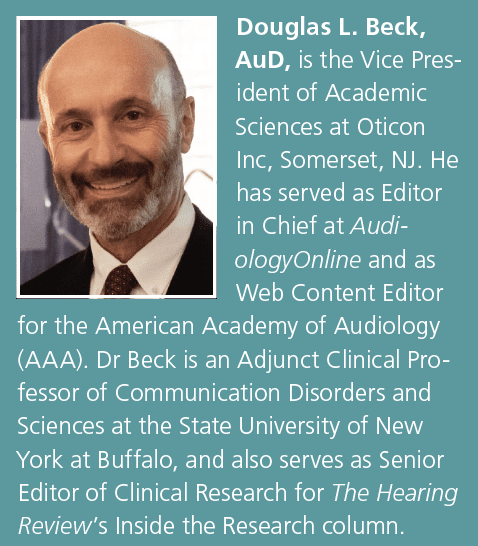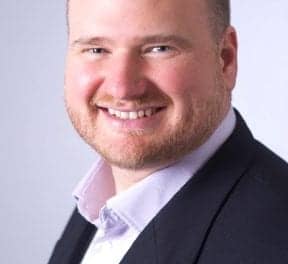Inside the Research | January 2022 Hearing Review
By Douglas L. Beck, AuD
If you follow closely the published science surrounding hearing loss, cognition, and amplification, the work of Jennifer Deal, PhD, quickly becomes apparent. Dr Deal —an epidemiologist and gerontologist at Johns Hopkins Bloomberg School of Public Health and Otolaryngology-Head and Neck Surgery at Johns Hopkins University School of Medicine—has coauthored many important papers1-5 on these topics with fellow researchers like Frank Lin, PhD, and Nicholas Reed, PhD, who have also appeared in the pages of Hearing Review and in this column.6-8 This brilliant group has been at the forefront of what in my view may be the most exciting research area in hearing science: the links between the brain, cognitive status, and hearing loss.
In particular, Dr Deal studies how hearing impairment and vascular factors influence cognition, as well as possible strategies for prevention of cognitive decline and dementia in older adults. Since 2018, Dr Deal’s group has been working on the Aging and Cognitive Health Evaluation in Elders (ACHIEVE) study, the first randomized trial to determine efficacy of a best practices hearing intervention on reducing cognitive decline in older adults with hearing loss. And, as an epidemiologist, she is uniquely qualified to explain some of the “trickier” aspects related to what we know—and can actually say—about hearing loss and cognitive decline.
Beck: Good morning, Jennifer. It’s an honor to speak with you after reading so many of your articles over the last decade or so!
Deal: Thanks Doug. I appreciate the opportunity to speak to the readers of the Hearing Review and I appreciate your invitation.
Beck: As an epidemiologist and gerontologist at Johns Hopkins Bloomberg School of Public Health, you’ve spent a lot of time and energy examining the relationship between cognition and audition. However, before we get to that, let’s clarify exactly what an epidemiologist and gerontologist does. My understanding is that an epidemiologist studies the incidence, pathways, as well as possible and probable spread and control of diseases across the population. Further, although a geriatrician is a physician who works with older adults one-on-one (generally speaking), a gerontologist is more academically oriented, studying aging and working with other health professionals to inform, educate, and improve the aging process. Did I get that right?
Deal: Right. Epidemiology is the science of public health. It is the study of disease and health in a population, including what factors influence their distribution over time. As you said, what distinguishes epidemiology from some other disciplines is that conclusions from epidemiologic studies are made at the population level. This allows us to see, and importantly, to predict patterns that we can’t see at the level of the individual. But it also means that we can’t directly apply our findings, which are about the average in a population, to any one person.
And you are correct about the distinction between geriatrics and gerontology, too. Geriatrics refers to the clinical care of older adults. Gerontology is broader and includes multiple disciplines. But both are concerned with maximizing health and function of older adults. I have PhD training, but am not a clinician, so I refer to myself as a gerontologist.
Beck: I’d like to get your thoughts on the following statement: “Untreated hearing loss exacerbates cognitive decline.” Are you comfortable with that?
Deal: Yes, given what we currently know, that statement seems to be true most of the time across the population. However, as I said, that may or may not be true for an individual. And, to be clear, we do not know that hearing loss causes cognitive decline, so we don’t yet know if treating hearing loss will help delay or prevent cognitive decline. Our group, and others, are trying to answer these questions with ongoing research, and hopefully we’ll be able to make conclusive statements about that in the next year or two.
Beck: Excellent points. Thank you. Supposing that, as a random point of discussion, we pick people 70 years of age and older with untreated, documented (not “self-perceived”) age-related hearing loss which is of a mild-to-moderate sensorineural nature. And so, with due consideration for the Lancet 2020 publication by Livingston et al9 which stated hearing loss is the largest of all individual modifiable risk factors for dementia, with a population attributable factor (PAF) of 8.2%, what can we accurately tell patients about their hearing loss and cognitive decline?
Deal: I’m glad you asked this question. The PAF is an important measure, and it’s a little tricky to understand the PAF and how it fits in here. The PAF attributable to hearing loss means that, of all the dementia cases in the world, 8.2% might be due to hearing loss. Further, it suggests that perhaps 8.2% of dementia could have been prevented through treatment, such as hearing aids or through other hearing loss prevention methods like hearing protection devices (HPDs), less noise exposure, etc.
However, we have to be cautious with this interpretation, as the PAF has some strong assumptions behind it, including that hearing loss causes dementia. As we’ve discussed, we don’t yet know if this is the case. Additionally, as you’ve implied, we have to be very careful when we interpret epidemiologic measures for individual patients, as there is no one-to-one correlation between the global numbers (the PAF) and the individual risk. The PAF addresses a general global trend, which may or may not be true for a particular individual.
Further, the PAF you’re referring to was based on only three studies, and importantly, each of those studies were from wealthy countries—USA and UK—and had majority or exclusively white participants, not people of color. So, we’re not certain whether that PAF holds true for the larger global community. However, despite methodologic constraints, we are finding a consistent story with the research: hearing loss does seem to increase risk for cognitive decline, but more work is needed to make causal statements.
Beck: And so again, to be clear, we don’t know if hearing loss directly causes dementia. In fact, there are quite a few hypotheses which could explain why many older people, certainly not all, often have hearing loss and dementia. The most-cited hypothesis [eg, see Beck et al10 is probably the “common-cause” hypothesis, an example of which could be reduced neurovascular blood flow to the ear and the brain, manifesting in hearing loss and cognitive decline, respectively.
Deal: Exactly. It’s possible that some common risk factor is leading both to hearing loss and to cognitive decline. That is, hearing loss may not be a “direct cause” of dementia but may track along with other factors which are direct causes. This is the common-cause hypothesis which you mentioned. In our studies, we do our best to adjust for these possible common causes, accounting for things like diabetes, hypertension, smoking, etc, but we can’t be certain that we’ve accounted for everything in any one given study.
That’s why it’s important to conduct multiple studies in multiple populations—to see if the story is consistent. Randomized studies can also help with this concern. In a randomized controlled trial, because individuals are assigned to receive one treatment or another in a random way, the treatment an individual receives is not linked to any of their characteristics, including those potential common causes. That helps us to isolate the effect of the treatment, independent of those potential common causes.
Beck: Excellent points Jennifer. So that gets us to the Aging and Cognitive Health Evaluation in Elders (ACHIEVE) study. I believe you have over 900 people you’re following, working with, and collecting data on, to better establish the relationship between hearing and dementia or cognitive decline?
Deal: Yes. I’m part of a team of researchers working on the study, which is funded by the National Institute on Aging and led by Drs Frank Lin and Josef Coresh at Johns Hopkins University. It is an ongoing longitudinal study and probably won’t be completed and released until 2023 due to data-gathering difficulty during the COVID-19 pandemic.
The ACHIEVE study started in 2018 and recruited people without dementia between the ages of 70 and 84 years with mild-to-moderate hearing loss. We have four sites across the USA gathering data and will report on the 3-year change in global cognitive function among our participants, as well as domain-specific cognitive decline, incident dementia, MRI changes in brain anatomy, health-related quality of life, physical and social function, and physical activity. Across all participants we’ll be examining outcomes based on assignment to hearing treatment via hearing aid fittings and rehabilitation, versus health education and counseling without amplification.
Beck: Fascinating work Jennifer. Thanks for sharing your time and I’ll look forward to a follow-up interview with you once the ACHIEVE study is published.
Deal: I’ll look forward to that as well! Thanks Doug.

CORRESPONDENCE can be addressed to Dr Beck at: [email protected].
Citation for this article: Beck DL. The ACHIEVE study, cognition, amplification, and audition: An interview with Jennifer Deal, PhD. Hearing Review. 2022;29(1):30-31.
References
- Croll PH, Vernooij MW, Reid RI, et al. Hearing loss and microstructural integrity of the brain in a dementia-free older population. Alzheimers Dement. 2020;16(11):1515-1523.
- Deal JA, Reed NS, Kravetz AD, et al. Incident hearing loss and comorbidity: A longitudinal administrative claims study. JAMA Otolaryngol Head Neck Surg. 2019;145(1):36-43.
- Deal JA, Goman AM, Albert MS, et al Hearing treatment for reducing cognitive decline: Design and methods of the Aging and Cognitive Health Evaluation in Elders (ACHIEVE) randomized controlled trial. Alzheimers Dement. 2018;4(1):499-507.
- Deal JA, Albert MS, Arnold M, et al. A randomized feasibility pilot trial of hearing treatment for reducing cognitive decline: Results from the Aging and Cognitive Health Evaluation in Elders Pilot Study. Alzheimers Dement. 2017;3(3):410-415.
- Deal JA, Betz J, Yaffe K, et al. Hearing impairment and incident dementia and cognitive decline in older adults: The Health ABC Study. J Gerontol A Biol Sci Med Sci. 2017;72(5):703-709.
- Lin F. Hearing loss and dementia. Hearing Review. 2012;19(10):25.
- Strom K. Dr Frank Lin details consequences of age-related hearing loss and future avenues at ADA convention keynote. Hearing Review. 2014;21(12):30-31.
- Beck DL. PSAPs, OTC and self-fitting hearing aids, ACHIEVE, and more: An interview with Nicholas Reed, PhD. Hearing Review. 2020;27(11):26-28.
- Livingston G, Huntley J, Sommerlad A, et al. Dementia prevention, intervention, and care: 2020 report of the Lancet Commission. Lancet. 2020;396(10248):413-446.
- Beck DL, Bant S, Clarke NA. Hearing loss and cognition: A discussion for audiologists and hearing healthcare professionals. J Otolaryngol-ENT Res. 2020;12(3):72-78.





